Leadership, Management, and Operations in a Business: Unilever Report
VerifiedAdded on 2023/01/06
|13
|3959
|70
Report
AI Summary
This report analyzes leadership and management concepts within the context of Unilever, a multinational consumer goods company. It begins by comparing and contrasting the roles and characteristics of leaders and managers, emphasizing their complementary nature and the importance of both in organizational success. The report then examines the roles of leaders and managers in various situational contexts, such as recruitment, induction, conflict management, and change management. It further explores different leadership theories and approaches, including situational leadership, systems leadership, and contingency leadership. The report also delves into key approaches of operations management, such as Total Quality Management (TQM) and Just-in-Time (JIT), highlighting their significance in improving product and service quality. Finally, it discusses the factors that affect decision-making and operations management, concluding with an overview of the relationship between leadership and management in a contemporary business environment.
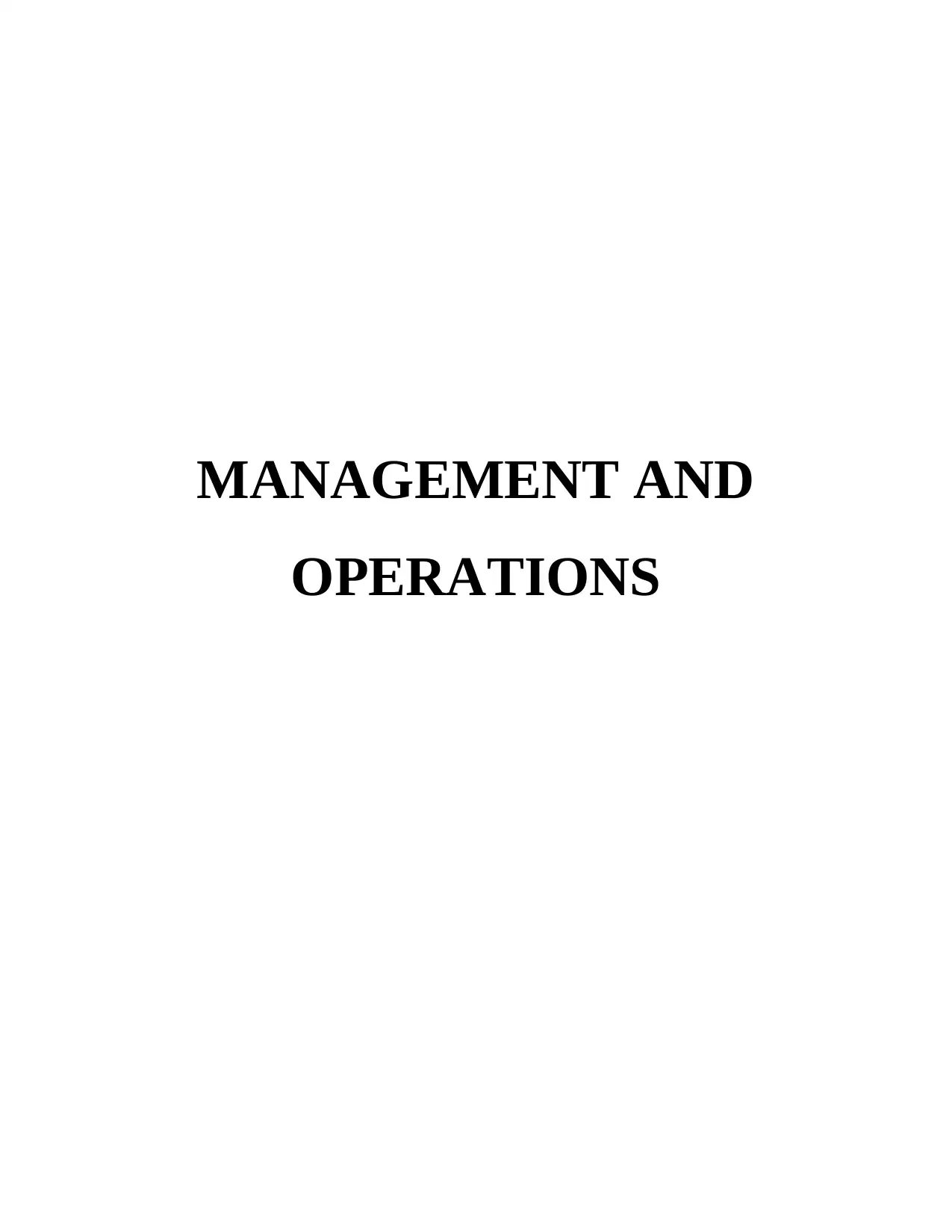
MANAGEMENT AND
OPERATIONS
OPERATIONS
Paraphrase This Document
Need a fresh take? Get an instant paraphrase of this document with our AI Paraphraser
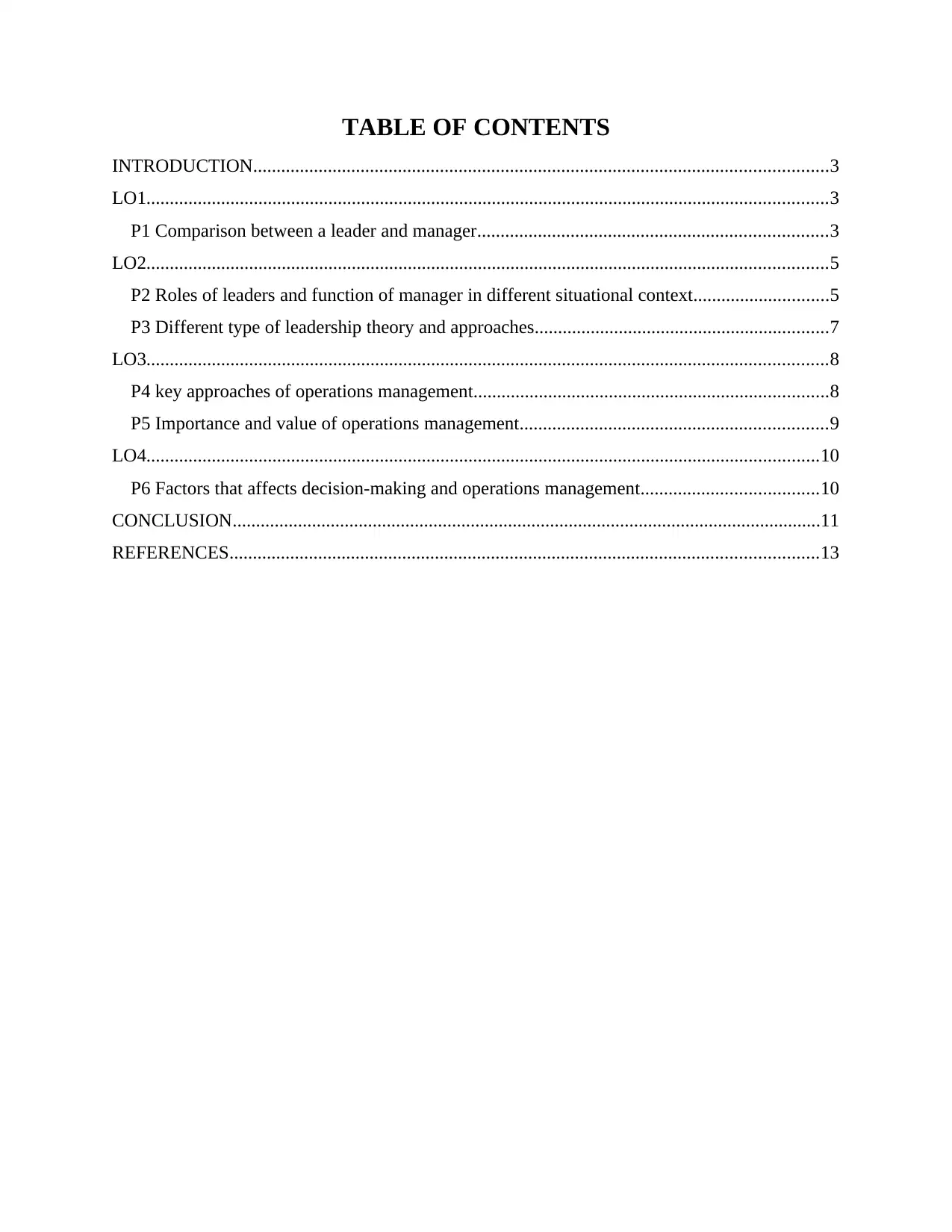
TABLE OF CONTENTS
INTRODUCTION...........................................................................................................................3
LO1..................................................................................................................................................3
P1 Comparison between a leader and manager...........................................................................3
LO2..................................................................................................................................................5
P2 Roles of leaders and function of manager in different situational context.............................5
P3 Different type of leadership theory and approaches...............................................................7
LO3..................................................................................................................................................8
P4 key approaches of operations management............................................................................8
P5 Importance and value of operations management..................................................................9
LO4................................................................................................................................................10
P6 Factors that affects decision-making and operations management......................................10
CONCLUSION..............................................................................................................................11
REFERENCES..............................................................................................................................13
INTRODUCTION...........................................................................................................................3
LO1..................................................................................................................................................3
P1 Comparison between a leader and manager...........................................................................3
LO2..................................................................................................................................................5
P2 Roles of leaders and function of manager in different situational context.............................5
P3 Different type of leadership theory and approaches...............................................................7
LO3..................................................................................................................................................8
P4 key approaches of operations management............................................................................8
P5 Importance and value of operations management..................................................................9
LO4................................................................................................................................................10
P6 Factors that affects decision-making and operations management......................................10
CONCLUSION..............................................................................................................................11
REFERENCES..............................................................................................................................13
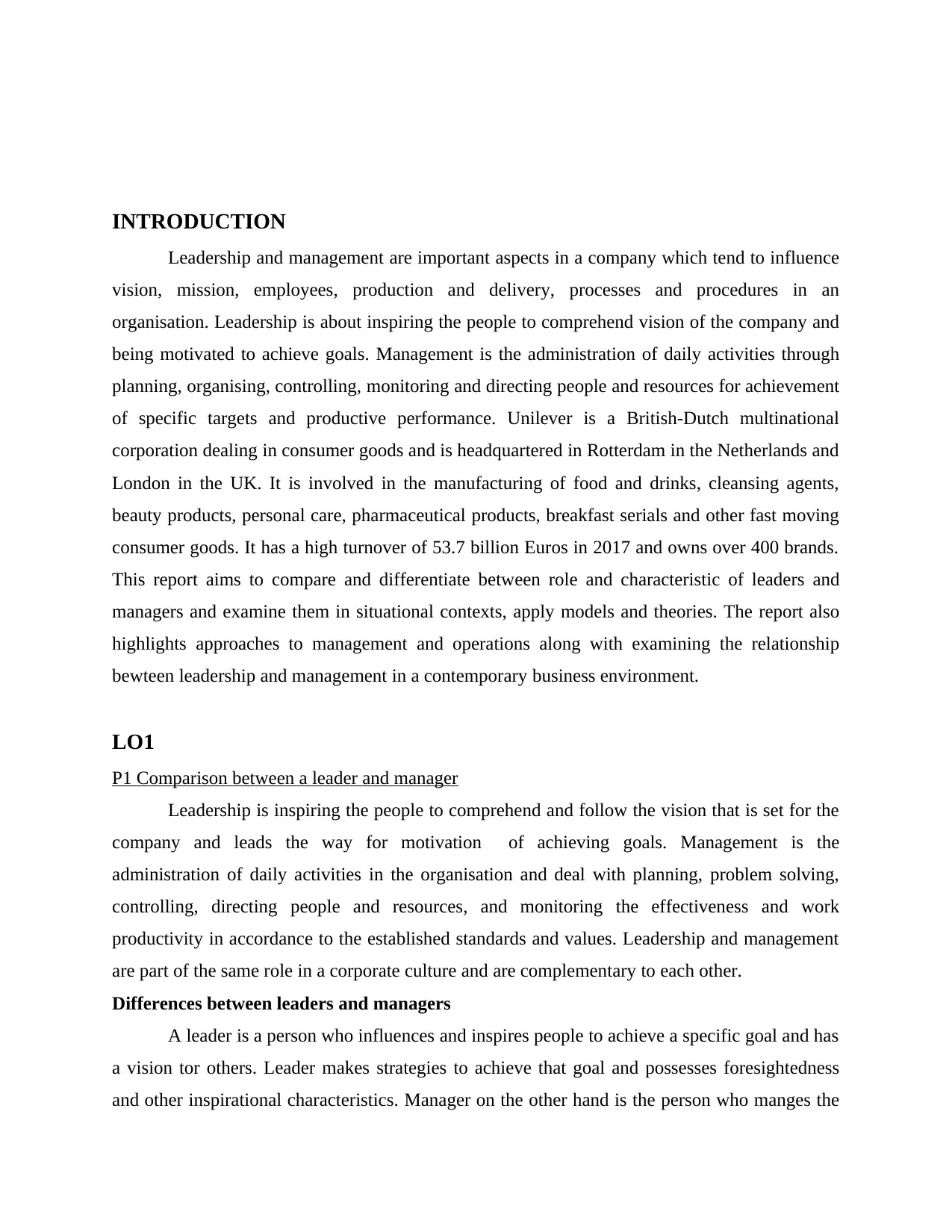
INTRODUCTION
Leadership and management are important aspects in a company which tend to influence
vision, mission, employees, production and delivery, processes and procedures in an
organisation. Leadership is about inspiring the people to comprehend vision of the company and
being motivated to achieve goals. Management is the administration of daily activities through
planning, organising, controlling, monitoring and directing people and resources for achievement
of specific targets and productive performance. Unilever is a British-Dutch multinational
corporation dealing in consumer goods and is headquartered in Rotterdam in the Netherlands and
London in the UK. It is involved in the manufacturing of food and drinks, cleansing agents,
beauty products, personal care, pharmaceutical products, breakfast serials and other fast moving
consumer goods. It has a high turnover of 53.7 billion Euros in 2017 and owns over 400 brands.
This report aims to compare and differentiate between role and characteristic of leaders and
managers and examine them in situational contexts, apply models and theories. The report also
highlights approaches to management and operations along with examining the relationship
bewteen leadership and management in a contemporary business environment.
LO1
P1 Comparison between a leader and manager
Leadership is inspiring the people to comprehend and follow the vision that is set for the
company and leads the way for motivation of achieving goals. Management is the
administration of daily activities in the organisation and deal with planning, problem solving,
controlling, directing people and resources, and monitoring the effectiveness and work
productivity in accordance to the established standards and values. Leadership and management
are part of the same role in a corporate culture and are complementary to each other.
Differences between leaders and managers
A leader is a person who influences and inspires people to achieve a specific goal and has
a vision tor others. Leader makes strategies to achieve that goal and possesses foresightedness
and other inspirational characteristics. Manager on the other hand is the person who manges the
Leadership and management are important aspects in a company which tend to influence
vision, mission, employees, production and delivery, processes and procedures in an
organisation. Leadership is about inspiring the people to comprehend vision of the company and
being motivated to achieve goals. Management is the administration of daily activities through
planning, organising, controlling, monitoring and directing people and resources for achievement
of specific targets and productive performance. Unilever is a British-Dutch multinational
corporation dealing in consumer goods and is headquartered in Rotterdam in the Netherlands and
London in the UK. It is involved in the manufacturing of food and drinks, cleansing agents,
beauty products, personal care, pharmaceutical products, breakfast serials and other fast moving
consumer goods. It has a high turnover of 53.7 billion Euros in 2017 and owns over 400 brands.
This report aims to compare and differentiate between role and characteristic of leaders and
managers and examine them in situational contexts, apply models and theories. The report also
highlights approaches to management and operations along with examining the relationship
bewteen leadership and management in a contemporary business environment.
LO1
P1 Comparison between a leader and manager
Leadership is inspiring the people to comprehend and follow the vision that is set for the
company and leads the way for motivation of achieving goals. Management is the
administration of daily activities in the organisation and deal with planning, problem solving,
controlling, directing people and resources, and monitoring the effectiveness and work
productivity in accordance to the established standards and values. Leadership and management
are part of the same role in a corporate culture and are complementary to each other.
Differences between leaders and managers
A leader is a person who influences and inspires people to achieve a specific goal and has
a vision tor others. Leader makes strategies to achieve that goal and possesses foresightedness
and other inspirational characteristics. Manager on the other hand is the person who manges the
⊘ This is a preview!⊘
Do you want full access?
Subscribe today to unlock all pages.

Trusted by 1+ million students worldwide
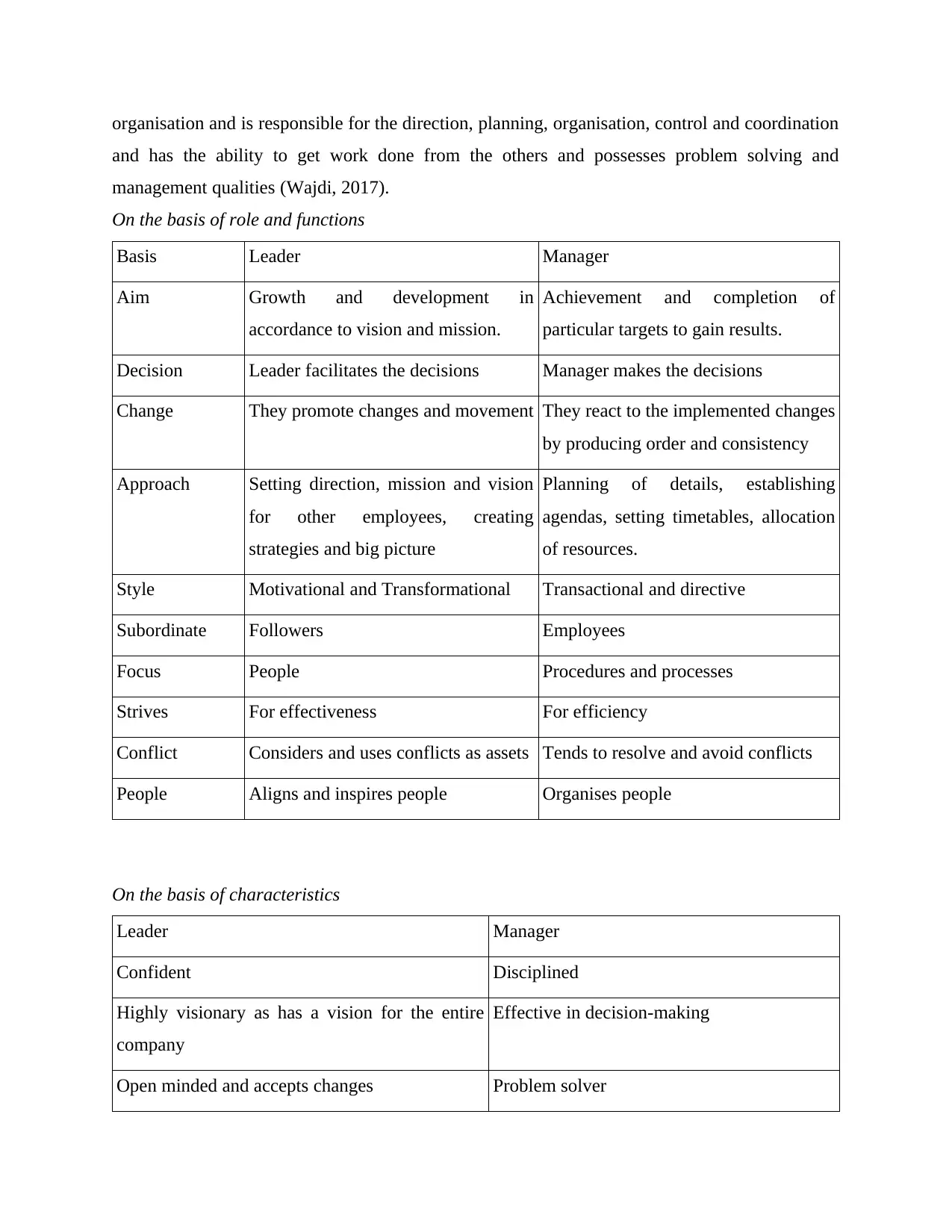
organisation and is responsible for the direction, planning, organisation, control and coordination
and has the ability to get work done from the others and possesses problem solving and
management qualities (Wajdi, 2017).
On the basis of role and functions
Basis Leader Manager
Aim Growth and development in
accordance to vision and mission.
Achievement and completion of
particular targets to gain results.
Decision Leader facilitates the decisions Manager makes the decisions
Change They promote changes and movement They react to the implemented changes
by producing order and consistency
Approach Setting direction, mission and vision
for other employees, creating
strategies and big picture
Planning of details, establishing
agendas, setting timetables, allocation
of resources.
Style Motivational and Transformational Transactional and directive
Subordinate Followers Employees
Focus People Procedures and processes
Strives For effectiveness For efficiency
Conflict Considers and uses conflicts as assets Tends to resolve and avoid conflicts
People Aligns and inspires people Organises people
On the basis of characteristics
Leader Manager
Confident Disciplined
Highly visionary as has a vision for the entire
company
Effective in decision-making
Open minded and accepts changes Problem solver
and has the ability to get work done from the others and possesses problem solving and
management qualities (Wajdi, 2017).
On the basis of role and functions
Basis Leader Manager
Aim Growth and development in
accordance to vision and mission.
Achievement and completion of
particular targets to gain results.
Decision Leader facilitates the decisions Manager makes the decisions
Change They promote changes and movement They react to the implemented changes
by producing order and consistency
Approach Setting direction, mission and vision
for other employees, creating
strategies and big picture
Planning of details, establishing
agendas, setting timetables, allocation
of resources.
Style Motivational and Transformational Transactional and directive
Subordinate Followers Employees
Focus People Procedures and processes
Strives For effectiveness For efficiency
Conflict Considers and uses conflicts as assets Tends to resolve and avoid conflicts
People Aligns and inspires people Organises people
On the basis of characteristics
Leader Manager
Confident Disciplined
Highly visionary as has a vision for the entire
company
Effective in decision-making
Open minded and accepts changes Problem solver
Paraphrase This Document
Need a fresh take? Get an instant paraphrase of this document with our AI Paraphraser
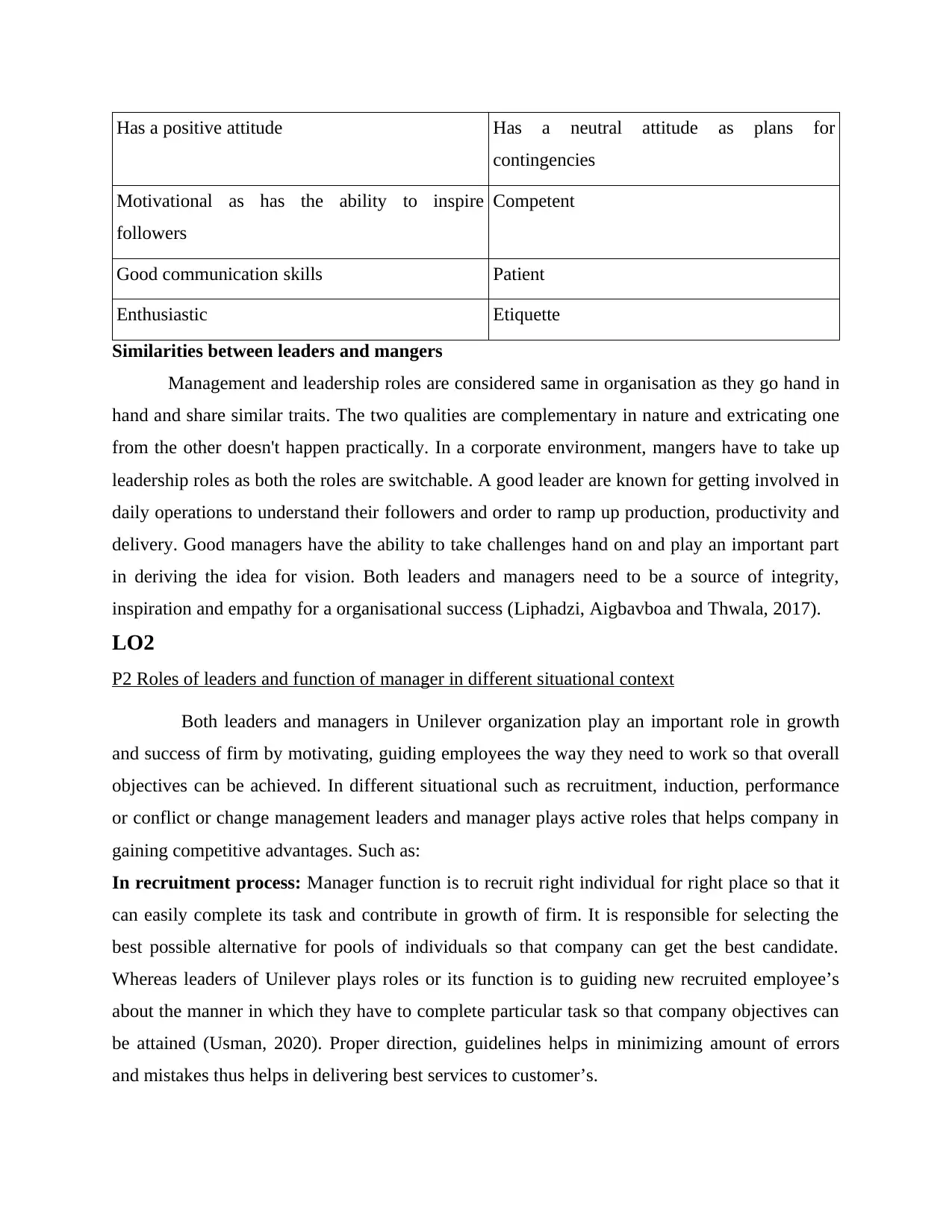
Has a positive attitude Has a neutral attitude as plans for
contingencies
Motivational as has the ability to inspire
followers
Competent
Good communication skills Patient
Enthusiastic Etiquette
Similarities between leaders and mangers
Management and leadership roles are considered same in organisation as they go hand in
hand and share similar traits. The two qualities are complementary in nature and extricating one
from the other doesn't happen practically. In a corporate environment, mangers have to take up
leadership roles as both the roles are switchable. A good leader are known for getting involved in
daily operations to understand their followers and order to ramp up production, productivity and
delivery. Good managers have the ability to take challenges hand on and play an important part
in deriving the idea for vision. Both leaders and managers need to be a source of integrity,
inspiration and empathy for a organisational success (Liphadzi, Aigbavboa and Thwala, 2017).
LO2
P2 Roles of leaders and function of manager in different situational context
Both leaders and managers in Unilever organization play an important role in growth
and success of firm by motivating, guiding employees the way they need to work so that overall
objectives can be achieved. In different situational such as recruitment, induction, performance
or conflict or change management leaders and manager plays active roles that helps company in
gaining competitive advantages. Such as:
In recruitment process: Manager function is to recruit right individual for right place so that it
can easily complete its task and contribute in growth of firm. It is responsible for selecting the
best possible alternative for pools of individuals so that company can get the best candidate.
Whereas leaders of Unilever plays roles or its function is to guiding new recruited employee’s
about the manner in which they have to complete particular task so that company objectives can
be attained (Usman, 2020). Proper direction, guidelines helps in minimizing amount of errors
and mistakes thus helps in delivering best services to customer’s.
contingencies
Motivational as has the ability to inspire
followers
Competent
Good communication skills Patient
Enthusiastic Etiquette
Similarities between leaders and mangers
Management and leadership roles are considered same in organisation as they go hand in
hand and share similar traits. The two qualities are complementary in nature and extricating one
from the other doesn't happen practically. In a corporate environment, mangers have to take up
leadership roles as both the roles are switchable. A good leader are known for getting involved in
daily operations to understand their followers and order to ramp up production, productivity and
delivery. Good managers have the ability to take challenges hand on and play an important part
in deriving the idea for vision. Both leaders and managers need to be a source of integrity,
inspiration and empathy for a organisational success (Liphadzi, Aigbavboa and Thwala, 2017).
LO2
P2 Roles of leaders and function of manager in different situational context
Both leaders and managers in Unilever organization play an important role in growth
and success of firm by motivating, guiding employees the way they need to work so that overall
objectives can be achieved. In different situational such as recruitment, induction, performance
or conflict or change management leaders and manager plays active roles that helps company in
gaining competitive advantages. Such as:
In recruitment process: Manager function is to recruit right individual for right place so that it
can easily complete its task and contribute in growth of firm. It is responsible for selecting the
best possible alternative for pools of individuals so that company can get the best candidate.
Whereas leaders of Unilever plays roles or its function is to guiding new recruited employee’s
about the manner in which they have to complete particular task so that company objectives can
be attained (Usman, 2020). Proper direction, guidelines helps in minimizing amount of errors
and mistakes thus helps in delivering best services to customer’s.
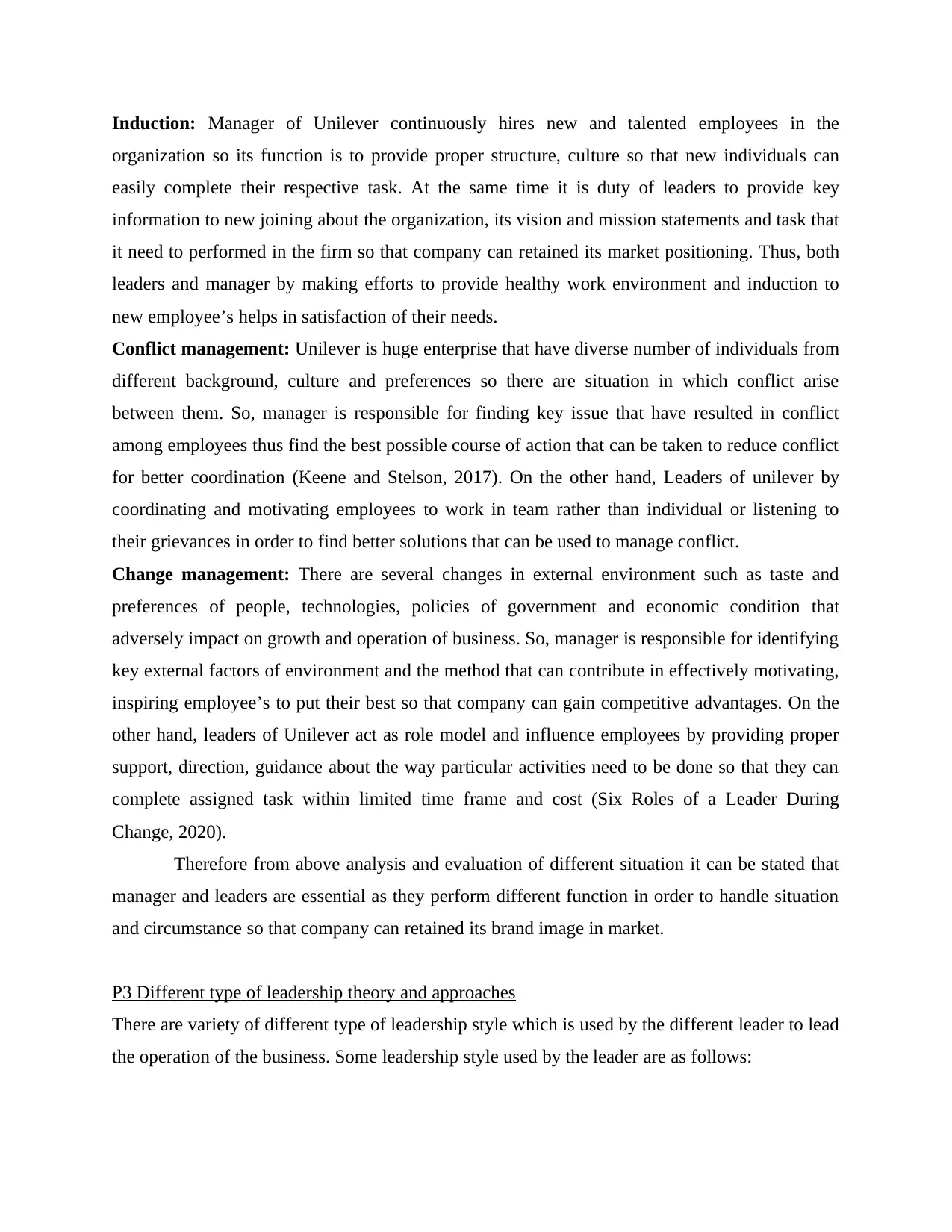
Induction: Manager of Unilever continuously hires new and talented employees in the
organization so its function is to provide proper structure, culture so that new individuals can
easily complete their respective task. At the same time it is duty of leaders to provide key
information to new joining about the organization, its vision and mission statements and task that
it need to performed in the firm so that company can retained its market positioning. Thus, both
leaders and manager by making efforts to provide healthy work environment and induction to
new employee’s helps in satisfaction of their needs.
Conflict management: Unilever is huge enterprise that have diverse number of individuals from
different background, culture and preferences so there are situation in which conflict arise
between them. So, manager is responsible for finding key issue that have resulted in conflict
among employees thus find the best possible course of action that can be taken to reduce conflict
for better coordination (Keene and Stelson, 2017). On the other hand, Leaders of unilever by
coordinating and motivating employees to work in team rather than individual or listening to
their grievances in order to find better solutions that can be used to manage conflict.
Change management: There are several changes in external environment such as taste and
preferences of people, technologies, policies of government and economic condition that
adversely impact on growth and operation of business. So, manager is responsible for identifying
key external factors of environment and the method that can contribute in effectively motivating,
inspiring employee’s to put their best so that company can gain competitive advantages. On the
other hand, leaders of Unilever act as role model and influence employees by providing proper
support, direction, guidance about the way particular activities need to be done so that they can
complete assigned task within limited time frame and cost (Six Roles of a Leader During
Change, 2020).
Therefore from above analysis and evaluation of different situation it can be stated that
manager and leaders are essential as they perform different function in order to handle situation
and circumstance so that company can retained its brand image in market.
P3 Different type of leadership theory and approaches
There are variety of different type of leadership style which is used by the different leader to lead
the operation of the business. Some leadership style used by the leader are as follows:
organization so its function is to provide proper structure, culture so that new individuals can
easily complete their respective task. At the same time it is duty of leaders to provide key
information to new joining about the organization, its vision and mission statements and task that
it need to performed in the firm so that company can retained its market positioning. Thus, both
leaders and manager by making efforts to provide healthy work environment and induction to
new employee’s helps in satisfaction of their needs.
Conflict management: Unilever is huge enterprise that have diverse number of individuals from
different background, culture and preferences so there are situation in which conflict arise
between them. So, manager is responsible for finding key issue that have resulted in conflict
among employees thus find the best possible course of action that can be taken to reduce conflict
for better coordination (Keene and Stelson, 2017). On the other hand, Leaders of unilever by
coordinating and motivating employees to work in team rather than individual or listening to
their grievances in order to find better solutions that can be used to manage conflict.
Change management: There are several changes in external environment such as taste and
preferences of people, technologies, policies of government and economic condition that
adversely impact on growth and operation of business. So, manager is responsible for identifying
key external factors of environment and the method that can contribute in effectively motivating,
inspiring employee’s to put their best so that company can gain competitive advantages. On the
other hand, leaders of Unilever act as role model and influence employees by providing proper
support, direction, guidance about the way particular activities need to be done so that they can
complete assigned task within limited time frame and cost (Six Roles of a Leader During
Change, 2020).
Therefore from above analysis and evaluation of different situation it can be stated that
manager and leaders are essential as they perform different function in order to handle situation
and circumstance so that company can retained its brand image in market.
P3 Different type of leadership theory and approaches
There are variety of different type of leadership style which is used by the different leader to lead
the operation of the business. Some leadership style used by the leader are as follows:
⊘ This is a preview!⊘
Do you want full access?
Subscribe today to unlock all pages.

Trusted by 1+ million students worldwide
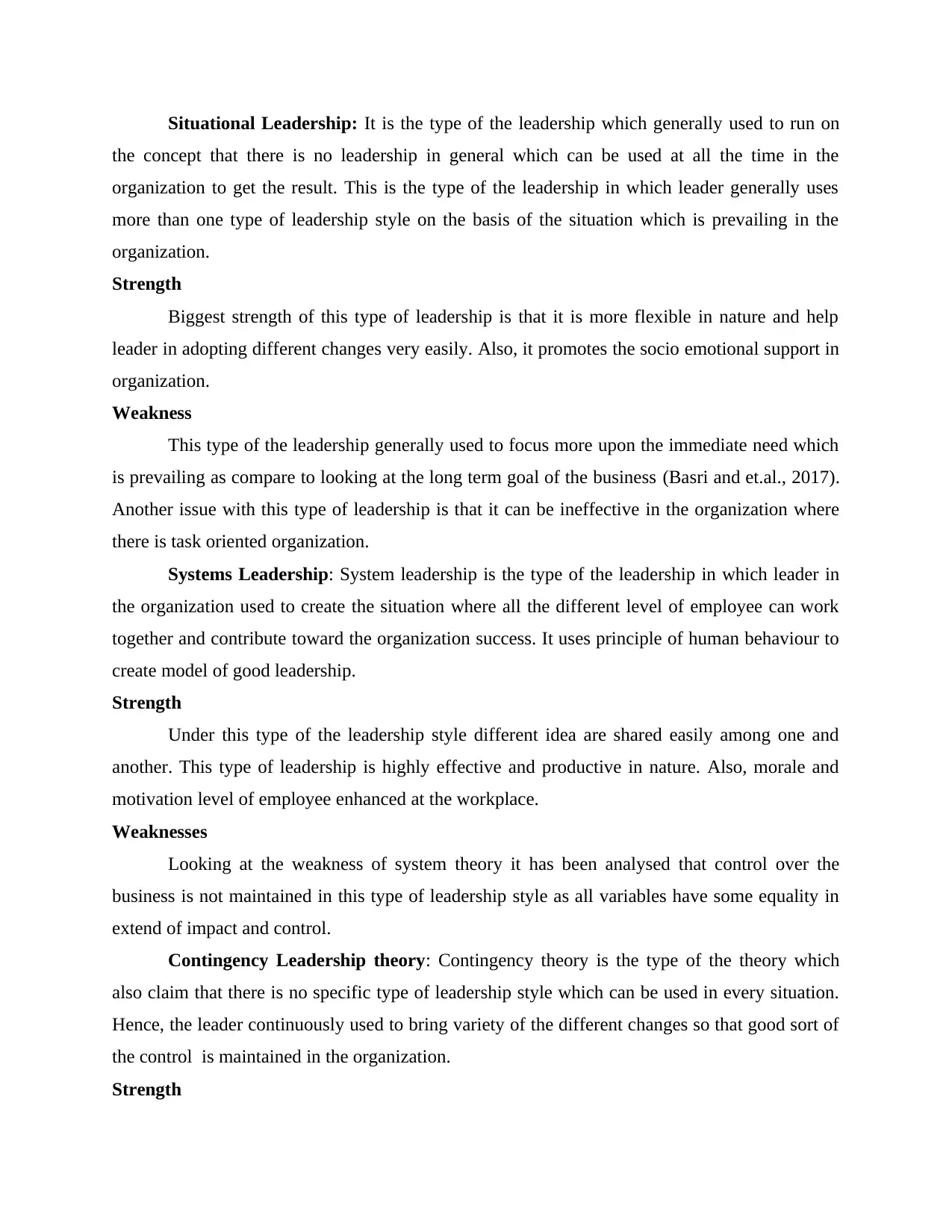
Situational Leadership: It is the type of the leadership which generally used to run on
the concept that there is no leadership in general which can be used at all the time in the
organization to get the result. This is the type of the leadership in which leader generally uses
more than one type of leadership style on the basis of the situation which is prevailing in the
organization.
Strength
Biggest strength of this type of leadership is that it is more flexible in nature and help
leader in adopting different changes very easily. Also, it promotes the socio emotional support in
organization.
Weakness
This type of the leadership generally used to focus more upon the immediate need which
is prevailing as compare to looking at the long term goal of the business (Basri and et.al., 2017).
Another issue with this type of leadership is that it can be ineffective in the organization where
there is task oriented organization.
Systems Leadership: System leadership is the type of the leadership in which leader in
the organization used to create the situation where all the different level of employee can work
together and contribute toward the organization success. It uses principle of human behaviour to
create model of good leadership.
Strength
Under this type of the leadership style different idea are shared easily among one and
another. This type of leadership is highly effective and productive in nature. Also, morale and
motivation level of employee enhanced at the workplace.
Weaknesses
Looking at the weakness of system theory it has been analysed that control over the
business is not maintained in this type of leadership style as all variables have some equality in
extend of impact and control.
Contingency Leadership theory: Contingency theory is the type of the theory which
also claim that there is no specific type of leadership style which can be used in every situation.
Hence, the leader continuously used to bring variety of the different changes so that good sort of
the control is maintained in the organization.
Strength
the concept that there is no leadership in general which can be used at all the time in the
organization to get the result. This is the type of the leadership in which leader generally uses
more than one type of leadership style on the basis of the situation which is prevailing in the
organization.
Strength
Biggest strength of this type of leadership is that it is more flexible in nature and help
leader in adopting different changes very easily. Also, it promotes the socio emotional support in
organization.
Weakness
This type of the leadership generally used to focus more upon the immediate need which
is prevailing as compare to looking at the long term goal of the business (Basri and et.al., 2017).
Another issue with this type of leadership is that it can be ineffective in the organization where
there is task oriented organization.
Systems Leadership: System leadership is the type of the leadership in which leader in
the organization used to create the situation where all the different level of employee can work
together and contribute toward the organization success. It uses principle of human behaviour to
create model of good leadership.
Strength
Under this type of the leadership style different idea are shared easily among one and
another. This type of leadership is highly effective and productive in nature. Also, morale and
motivation level of employee enhanced at the workplace.
Weaknesses
Looking at the weakness of system theory it has been analysed that control over the
business is not maintained in this type of leadership style as all variables have some equality in
extend of impact and control.
Contingency Leadership theory: Contingency theory is the type of the theory which
also claim that there is no specific type of leadership style which can be used in every situation.
Hence, the leader continuously used to bring variety of the different changes so that good sort of
the control is maintained in the organization.
Strength
Paraphrase This Document
Need a fresh take? Get an instant paraphrase of this document with our AI Paraphraser
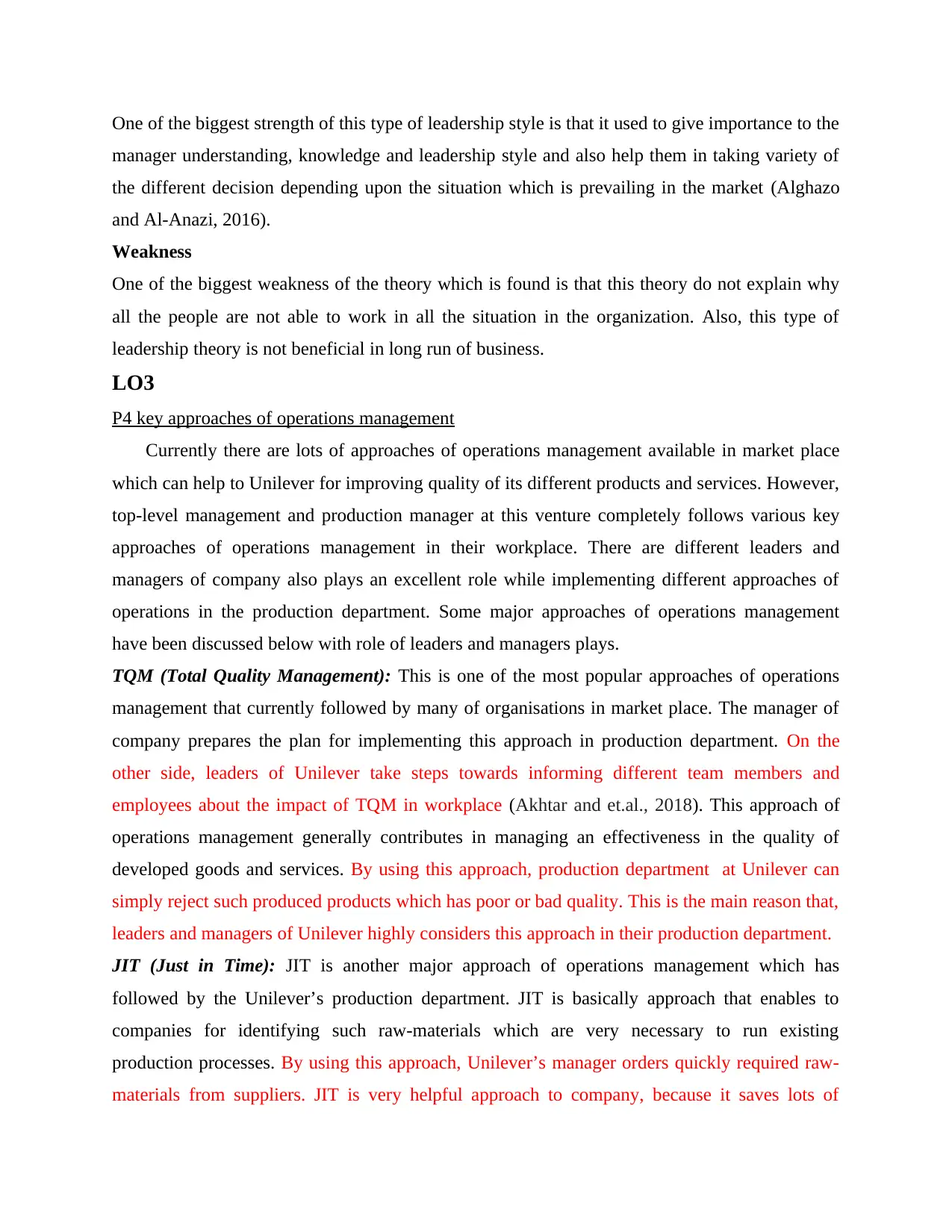
One of the biggest strength of this type of leadership style is that it used to give importance to the
manager understanding, knowledge and leadership style and also help them in taking variety of
the different decision depending upon the situation which is prevailing in the market (Alghazo
and Al-Anazi, 2016).
Weakness
One of the biggest weakness of the theory which is found is that this theory do not explain why
all the people are not able to work in all the situation in the organization. Also, this type of
leadership theory is not beneficial in long run of business.
LO3
P4 key approaches of operations management
Currently there are lots of approaches of operations management available in market place
which can help to Unilever for improving quality of its different products and services. However,
top-level management and production manager at this venture completely follows various key
approaches of operations management in their workplace. There are different leaders and
managers of company also plays an excellent role while implementing different approaches of
operations in the production department. Some major approaches of operations management
have been discussed below with role of leaders and managers plays.
TQM (Total Quality Management): This is one of the most popular approaches of operations
management that currently followed by many of organisations in market place. The manager of
company prepares the plan for implementing this approach in production department. On the
other side, leaders of Unilever take steps towards informing different team members and
employees about the impact of TQM in workplace (Akhtar and et.al., 2018). This approach of
operations management generally contributes in managing an effectiveness in the quality of
developed goods and services. By using this approach, production department at Unilever can
simply reject such produced products which has poor or bad quality. This is the main reason that,
leaders and managers of Unilever highly considers this approach in their production department.
JIT (Just in Time): JIT is another major approach of operations management which has
followed by the Unilever’s production department. JIT is basically approach that enables to
companies for identifying such raw-materials which are very necessary to run existing
production processes. By using this approach, Unilever’s manager orders quickly required raw-
materials from suppliers. JIT is very helpful approach to company, because it saves lots of
manager understanding, knowledge and leadership style and also help them in taking variety of
the different decision depending upon the situation which is prevailing in the market (Alghazo
and Al-Anazi, 2016).
Weakness
One of the biggest weakness of the theory which is found is that this theory do not explain why
all the people are not able to work in all the situation in the organization. Also, this type of
leadership theory is not beneficial in long run of business.
LO3
P4 key approaches of operations management
Currently there are lots of approaches of operations management available in market place
which can help to Unilever for improving quality of its different products and services. However,
top-level management and production manager at this venture completely follows various key
approaches of operations management in their workplace. There are different leaders and
managers of company also plays an excellent role while implementing different approaches of
operations in the production department. Some major approaches of operations management
have been discussed below with role of leaders and managers plays.
TQM (Total Quality Management): This is one of the most popular approaches of operations
management that currently followed by many of organisations in market place. The manager of
company prepares the plan for implementing this approach in production department. On the
other side, leaders of Unilever take steps towards informing different team members and
employees about the impact of TQM in workplace (Akhtar and et.al., 2018). This approach of
operations management generally contributes in managing an effectiveness in the quality of
developed goods and services. By using this approach, production department at Unilever can
simply reject such produced products which has poor or bad quality. This is the main reason that,
leaders and managers of Unilever highly considers this approach in their production department.
JIT (Just in Time): JIT is another major approach of operations management which has
followed by the Unilever’s production department. JIT is basically approach that enables to
companies for identifying such raw-materials which are very necessary to run existing
production processes. By using this approach, Unilever’s manager orders quickly required raw-
materials from suppliers. JIT is very helpful approach to company, because it saves lots of
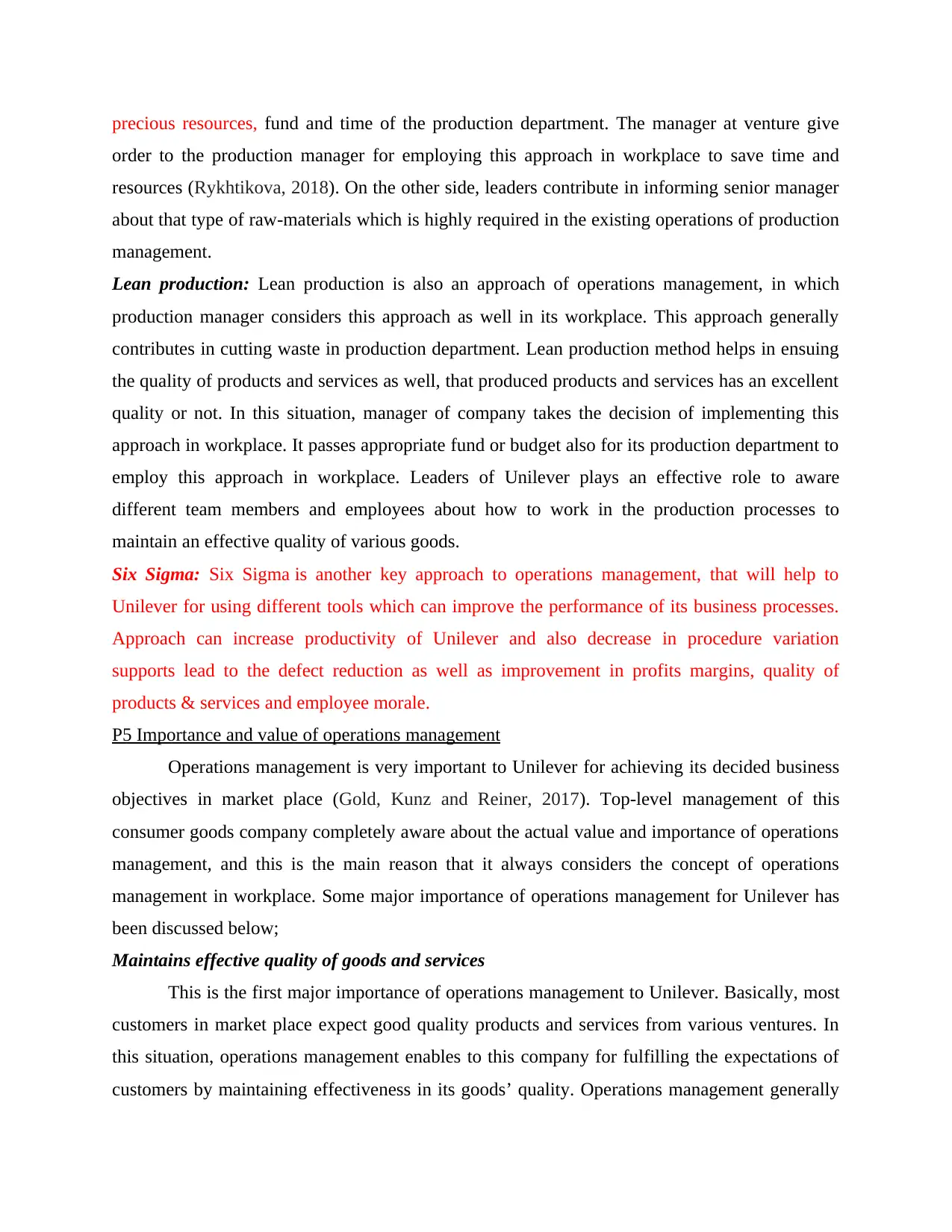
precious resources, fund and time of the production department. The manager at venture give
order to the production manager for employing this approach in workplace to save time and
resources (Rykhtikova, 2018). On the other side, leaders contribute in informing senior manager
about that type of raw-materials which is highly required in the existing operations of production
management.
Lean production: Lean production is also an approach of operations management, in which
production manager considers this approach as well in its workplace. This approach generally
contributes in cutting waste in production department. Lean production method helps in ensuing
the quality of products and services as well, that produced products and services has an excellent
quality or not. In this situation, manager of company takes the decision of implementing this
approach in workplace. It passes appropriate fund or budget also for its production department to
employ this approach in workplace. Leaders of Unilever plays an effective role to aware
different team members and employees about how to work in the production processes to
maintain an effective quality of various goods.
Six Sigma: Six Sigma is another key approach to operations management, that will help to
Unilever for using different tools which can improve the performance of its business processes.
Approach can increase productivity of Unilever and also decrease in procedure variation
supports lead to the defect reduction as well as improvement in profits margins, quality of
products & services and employee morale.
P5 Importance and value of operations management
Operations management is very important to Unilever for achieving its decided business
objectives in market place (Gold, Kunz and Reiner, 2017). Top-level management of this
consumer goods company completely aware about the actual value and importance of operations
management, and this is the main reason that it always considers the concept of operations
management in workplace. Some major importance of operations management for Unilever has
been discussed below;
Maintains effective quality of goods and services
This is the first major importance of operations management to Unilever. Basically, most
customers in market place expect good quality products and services from various ventures. In
this situation, operations management enables to this company for fulfilling the expectations of
customers by maintaining effectiveness in its goods’ quality. Operations management generally
order to the production manager for employing this approach in workplace to save time and
resources (Rykhtikova, 2018). On the other side, leaders contribute in informing senior manager
about that type of raw-materials which is highly required in the existing operations of production
management.
Lean production: Lean production is also an approach of operations management, in which
production manager considers this approach as well in its workplace. This approach generally
contributes in cutting waste in production department. Lean production method helps in ensuing
the quality of products and services as well, that produced products and services has an excellent
quality or not. In this situation, manager of company takes the decision of implementing this
approach in workplace. It passes appropriate fund or budget also for its production department to
employ this approach in workplace. Leaders of Unilever plays an effective role to aware
different team members and employees about how to work in the production processes to
maintain an effective quality of various goods.
Six Sigma: Six Sigma is another key approach to operations management, that will help to
Unilever for using different tools which can improve the performance of its business processes.
Approach can increase productivity of Unilever and also decrease in procedure variation
supports lead to the defect reduction as well as improvement in profits margins, quality of
products & services and employee morale.
P5 Importance and value of operations management
Operations management is very important to Unilever for achieving its decided business
objectives in market place (Gold, Kunz and Reiner, 2017). Top-level management of this
consumer goods company completely aware about the actual value and importance of operations
management, and this is the main reason that it always considers the concept of operations
management in workplace. Some major importance of operations management for Unilever has
been discussed below;
Maintains effective quality of goods and services
This is the first major importance of operations management to Unilever. Basically, most
customers in market place expect good quality products and services from various ventures. In
this situation, operations management enables to this company for fulfilling the expectations of
customers by maintaining effectiveness in its goods’ quality. Operations management generally
⊘ This is a preview!⊘
Do you want full access?
Subscribe today to unlock all pages.

Trusted by 1+ million students worldwide
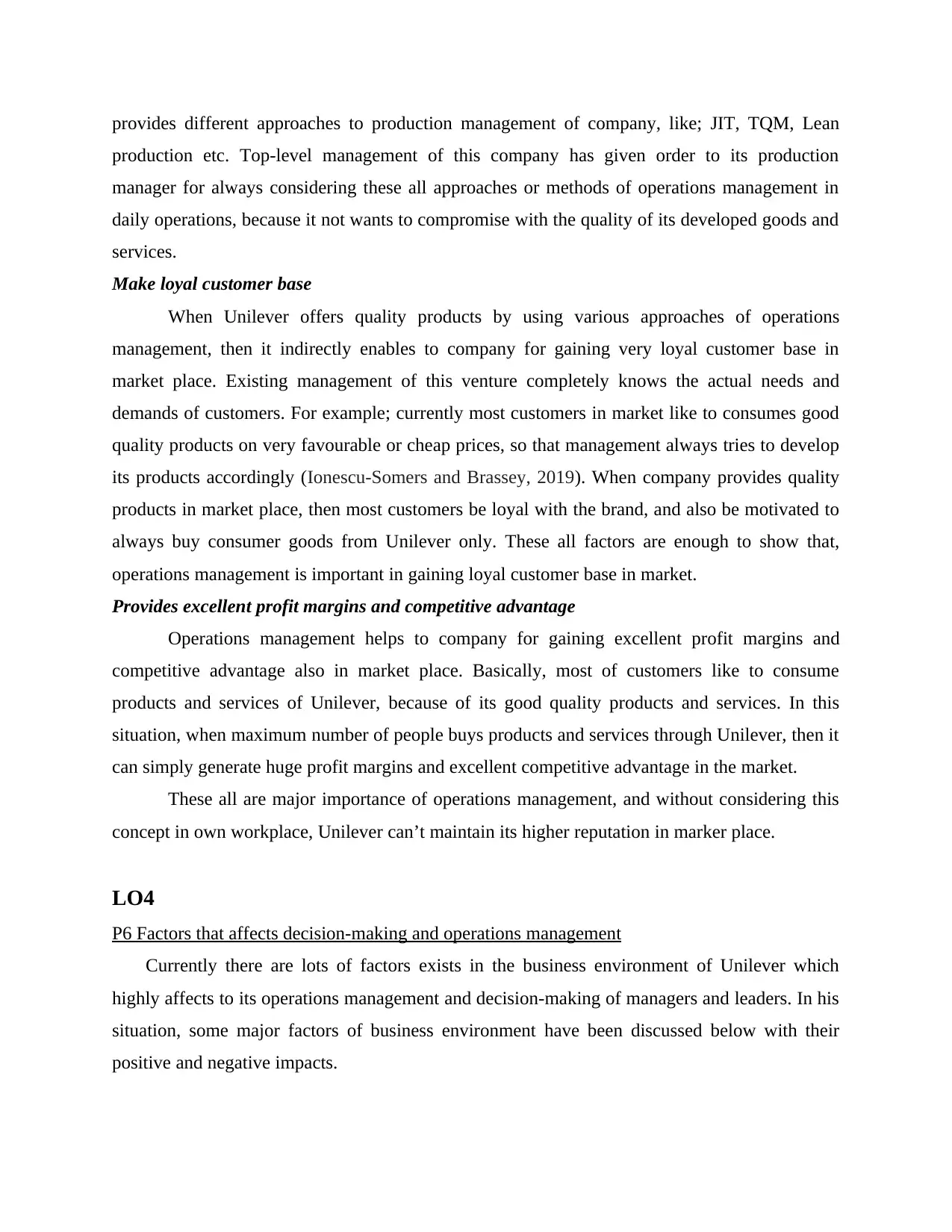
provides different approaches to production management of company, like; JIT, TQM, Lean
production etc. Top-level management of this company has given order to its production
manager for always considering these all approaches or methods of operations management in
daily operations, because it not wants to compromise with the quality of its developed goods and
services.
Make loyal customer base
When Unilever offers quality products by using various approaches of operations
management, then it indirectly enables to company for gaining very loyal customer base in
market place. Existing management of this venture completely knows the actual needs and
demands of customers. For example; currently most customers in market like to consumes good
quality products on very favourable or cheap prices, so that management always tries to develop
its products accordingly (Ionescu-Somers and Brassey, 2019). When company provides quality
products in market place, then most customers be loyal with the brand, and also be motivated to
always buy consumer goods from Unilever only. These all factors are enough to show that,
operations management is important in gaining loyal customer base in market.
Provides excellent profit margins and competitive advantage
Operations management helps to company for gaining excellent profit margins and
competitive advantage also in market place. Basically, most of customers like to consume
products and services of Unilever, because of its good quality products and services. In this
situation, when maximum number of people buys products and services through Unilever, then it
can simply generate huge profit margins and excellent competitive advantage in the market.
These all are major importance of operations management, and without considering this
concept in own workplace, Unilever can’t maintain its higher reputation in marker place.
LO4
P6 Factors that affects decision-making and operations management
Currently there are lots of factors exists in the business environment of Unilever which
highly affects to its operations management and decision-making of managers and leaders. In his
situation, some major factors of business environment have been discussed below with their
positive and negative impacts.
production etc. Top-level management of this company has given order to its production
manager for always considering these all approaches or methods of operations management in
daily operations, because it not wants to compromise with the quality of its developed goods and
services.
Make loyal customer base
When Unilever offers quality products by using various approaches of operations
management, then it indirectly enables to company for gaining very loyal customer base in
market place. Existing management of this venture completely knows the actual needs and
demands of customers. For example; currently most customers in market like to consumes good
quality products on very favourable or cheap prices, so that management always tries to develop
its products accordingly (Ionescu-Somers and Brassey, 2019). When company provides quality
products in market place, then most customers be loyal with the brand, and also be motivated to
always buy consumer goods from Unilever only. These all factors are enough to show that,
operations management is important in gaining loyal customer base in market.
Provides excellent profit margins and competitive advantage
Operations management helps to company for gaining excellent profit margins and
competitive advantage also in market place. Basically, most of customers like to consume
products and services of Unilever, because of its good quality products and services. In this
situation, when maximum number of people buys products and services through Unilever, then it
can simply generate huge profit margins and excellent competitive advantage in the market.
These all are major importance of operations management, and without considering this
concept in own workplace, Unilever can’t maintain its higher reputation in marker place.
LO4
P6 Factors that affects decision-making and operations management
Currently there are lots of factors exists in the business environment of Unilever which
highly affects to its operations management and decision-making of managers and leaders. In his
situation, some major factors of business environment have been discussed below with their
positive and negative impacts.
Paraphrase This Document
Need a fresh take? Get an instant paraphrase of this document with our AI Paraphraser
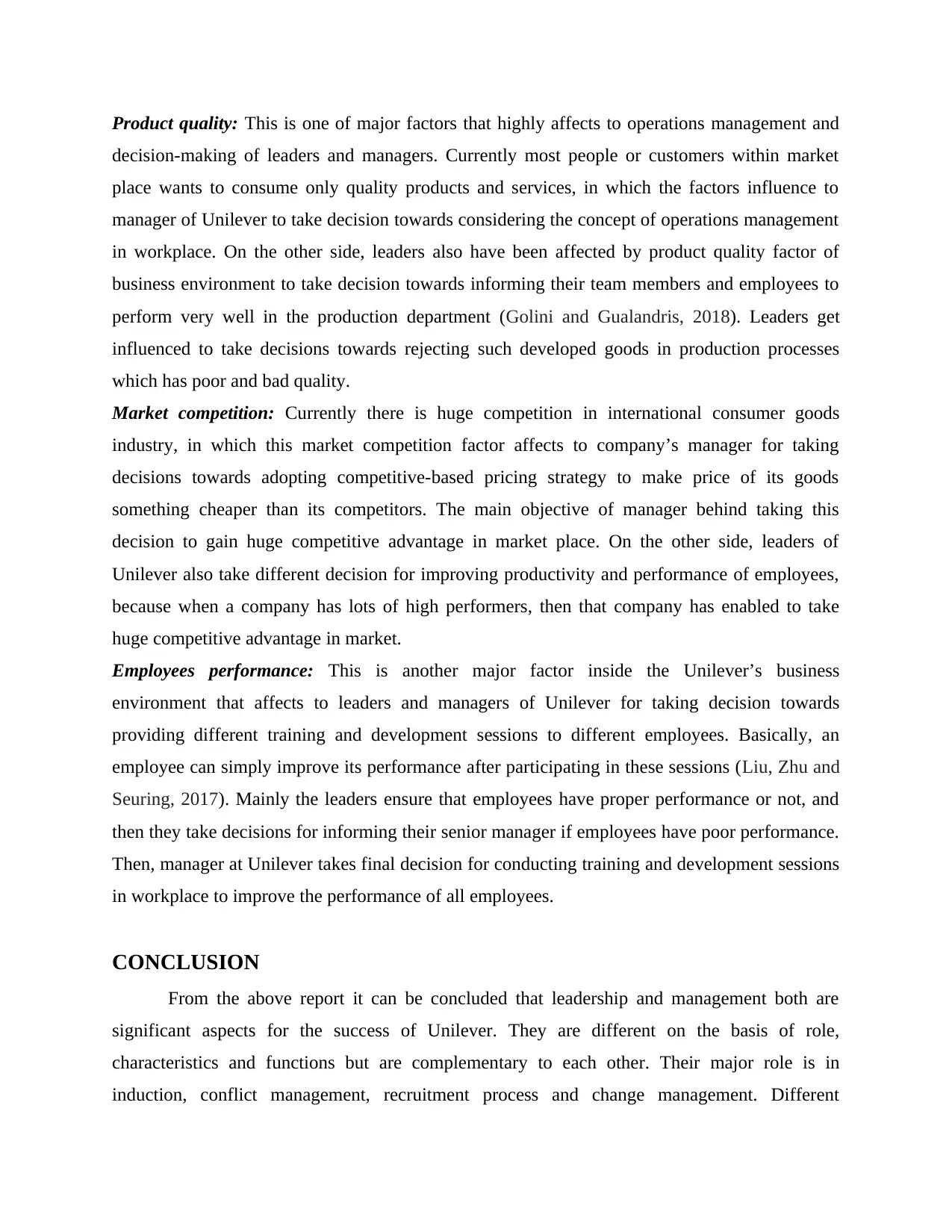
Product quality: This is one of major factors that highly affects to operations management and
decision-making of leaders and managers. Currently most people or customers within market
place wants to consume only quality products and services, in which the factors influence to
manager of Unilever to take decision towards considering the concept of operations management
in workplace. On the other side, leaders also have been affected by product quality factor of
business environment to take decision towards informing their team members and employees to
perform very well in the production department (Golini and Gualandris, 2018). Leaders get
influenced to take decisions towards rejecting such developed goods in production processes
which has poor and bad quality.
Market competition: Currently there is huge competition in international consumer goods
industry, in which this market competition factor affects to company’s manager for taking
decisions towards adopting competitive-based pricing strategy to make price of its goods
something cheaper than its competitors. The main objective of manager behind taking this
decision to gain huge competitive advantage in market place. On the other side, leaders of
Unilever also take different decision for improving productivity and performance of employees,
because when a company has lots of high performers, then that company has enabled to take
huge competitive advantage in market.
Employees performance: This is another major factor inside the Unilever’s business
environment that affects to leaders and managers of Unilever for taking decision towards
providing different training and development sessions to different employees. Basically, an
employee can simply improve its performance after participating in these sessions (Liu, Zhu and
Seuring, 2017). Mainly the leaders ensure that employees have proper performance or not, and
then they take decisions for informing their senior manager if employees have poor performance.
Then, manager at Unilever takes final decision for conducting training and development sessions
in workplace to improve the performance of all employees.
CONCLUSION
From the above report it can be concluded that leadership and management both are
significant aspects for the success of Unilever. They are different on the basis of role,
characteristics and functions but are complementary to each other. Their major role is in
induction, conflict management, recruitment process and change management. Different
decision-making of leaders and managers. Currently most people or customers within market
place wants to consume only quality products and services, in which the factors influence to
manager of Unilever to take decision towards considering the concept of operations management
in workplace. On the other side, leaders also have been affected by product quality factor of
business environment to take decision towards informing their team members and employees to
perform very well in the production department (Golini and Gualandris, 2018). Leaders get
influenced to take decisions towards rejecting such developed goods in production processes
which has poor and bad quality.
Market competition: Currently there is huge competition in international consumer goods
industry, in which this market competition factor affects to company’s manager for taking
decisions towards adopting competitive-based pricing strategy to make price of its goods
something cheaper than its competitors. The main objective of manager behind taking this
decision to gain huge competitive advantage in market place. On the other side, leaders of
Unilever also take different decision for improving productivity and performance of employees,
because when a company has lots of high performers, then that company has enabled to take
huge competitive advantage in market.
Employees performance: This is another major factor inside the Unilever’s business
environment that affects to leaders and managers of Unilever for taking decision towards
providing different training and development sessions to different employees. Basically, an
employee can simply improve its performance after participating in these sessions (Liu, Zhu and
Seuring, 2017). Mainly the leaders ensure that employees have proper performance or not, and
then they take decisions for informing their senior manager if employees have poor performance.
Then, manager at Unilever takes final decision for conducting training and development sessions
in workplace to improve the performance of all employees.
CONCLUSION
From the above report it can be concluded that leadership and management both are
significant aspects for the success of Unilever. They are different on the basis of role,
characteristics and functions but are complementary to each other. Their major role is in
induction, conflict management, recruitment process and change management. Different
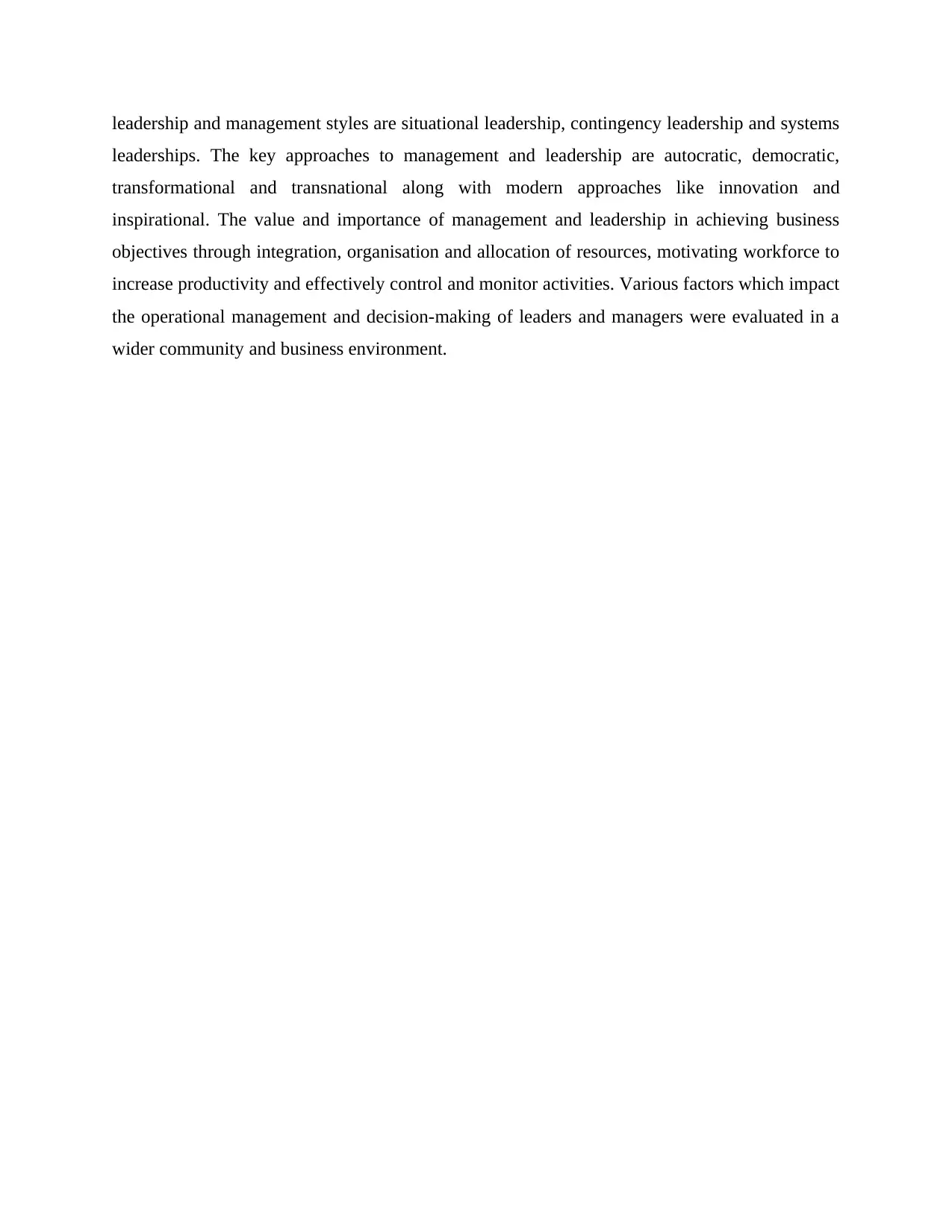
leadership and management styles are situational leadership, contingency leadership and systems
leaderships. The key approaches to management and leadership are autocratic, democratic,
transformational and transnational along with modern approaches like innovation and
inspirational. The value and importance of management and leadership in achieving business
objectives through integration, organisation and allocation of resources, motivating workforce to
increase productivity and effectively control and monitor activities. Various factors which impact
the operational management and decision-making of leaders and managers were evaluated in a
wider community and business environment.
leaderships. The key approaches to management and leadership are autocratic, democratic,
transformational and transnational along with modern approaches like innovation and
inspirational. The value and importance of management and leadership in achieving business
objectives through integration, organisation and allocation of resources, motivating workforce to
increase productivity and effectively control and monitor activities. Various factors which impact
the operational management and decision-making of leaders and managers were evaluated in a
wider community and business environment.
⊘ This is a preview!⊘
Do you want full access?
Subscribe today to unlock all pages.

Trusted by 1+ million students worldwide
1 out of 13
Related Documents
Your All-in-One AI-Powered Toolkit for Academic Success.
+13062052269
info@desklib.com
Available 24*7 on WhatsApp / Email
![[object Object]](/_next/static/media/star-bottom.7253800d.svg)
Unlock your academic potential
Copyright © 2020–2026 A2Z Services. All Rights Reserved. Developed and managed by ZUCOL.





